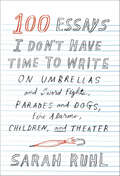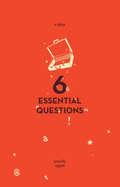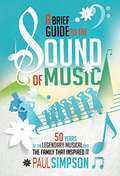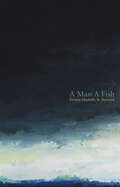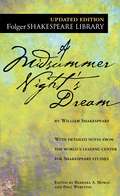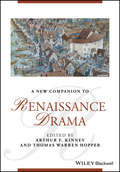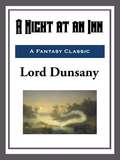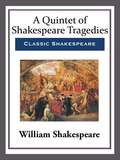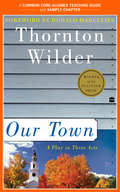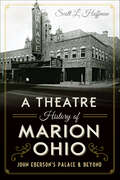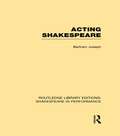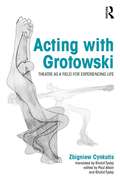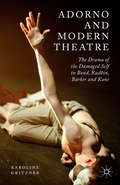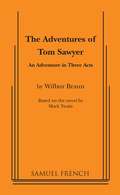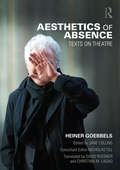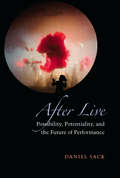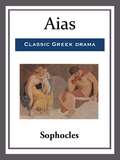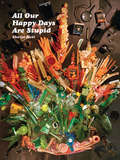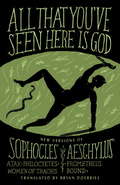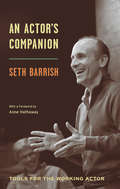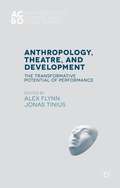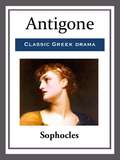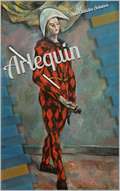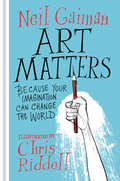- Table View
- List View
100 Essays I Don't Have Time to Write: On Umbrellas and Sword Fights, Parades and Dogs, Fire Alarms, Children, and Theater
by Sarah Ruhl100 Essays I Don't Have Time to Write is an incisive, idiosyncratic collection on life and theater from major American playwright Sarah Ruhl. This is a book in which chimpanzees, Chekhov, and child care are equally at home. A vibrant, provocative examination of the possibilities of the theater, it is also a map to a very particular artistic sensibility, and an unexpected guide for anyone who has chosen an artist's life. Sarah Ruhl is a mother of three and one of America's best-known playwrights. She has written a stunningly original book of essays whose concerns range from the most minimal and personal subjects to the most encompassing matters of art and culture. The titles themselves speak to the volume's uniqueness: "On lice," "On sleeping in the theater," "On motherhood and stools (the furniture kind)," "Greek masks and Bell's palsy."
6 Essential Questions
by Priscila Uppal6 Essential Questions tells the story of Renata as she travels to Brazil to reunite with the mother who abandoned her when she was just five years old. In Rio, Renata discovers more than she bargained for in her quest to uncover the truth of who abandoned whom. She is continually tossed about by her undead grandmother and a semi-invisible uncle as they choreograph the ultimate dance of mother and daughter, both of whom must confront their dreams before they can ever attempt to confront each other. Imaginations run wild in this strangely beautiful and funny story loosely based on Uppal’s critically acclaimed memoir, Projection: Encounters with My Runaway Mother, a finalist for both the Hilary Weston Writers’ Trust Prize for Nonfiction and the Governor General’s Literary Award for Non-Fiction.
A Brief Guide to The Sound of Music: 50 Years of the Legendary Musical and the Family who Inspired It (Brief Histories Ser.)
by Paul SimpsonEveryone has heard the songs from The Sound of Music by Rodgers and Hammerstein. The stage show was a roaring success in New York and London, and the much-loved feature film, directed by Hollywood veteran Robert Wise, continues to be a staple of television schedules 50 years after its release in 1965. In this fascinating and wide-ranging book, Paul Simpson explores the incredible story of the Von Trapp family and their escape from the Third Reich in all its incarnations, from real-life adventure, to book, to stage, to award-winning film to cultural phenomenon. He discusses the stage show, the many differences that were incorporated into the fictionalisation of the tale, and how that story was brought to the screen. He also looks at the numerous other ways in which the Von Trapp?s story has been told, including the two West German movies from the 1950s and the extensive forty-part Japanese anime series from the 1990s, to explain why the story of the Von Trapp family has appealed to so many generations.Praise for A Brief Guide to Stephen King:'The best book about King and his work I have ever read' Books Monthly
A Brief Guide to The Sound of Music: 50 Years of the Legendary Musical and the Family who Inspired It (Brief Histories)
by Paul SimpsonEveryone has heard the songs from The Sound of Music by Rodgers and Hammerstein. The stage show was a roaring success in New York and London, and the much-loved feature film, directed by Hollywood veteran Robert Wise, continues to be a staple of television schedules 50 years after its release in 1965. In this fascinating and wide-ranging book, Paul Simpson explores the incredible story of the Von Trapp family and their escape from the Third Reich in all its incarnations, from real-life adventure, to book, to stage, to award-winning film to cultural phenomenon. He discusses the stage show, the many differences that were incorporated into the fictionalisation of the tale, and how that story was brought to the screen. He also looks at the numerous other ways in which the Von Trapp’s story has been told, including the two West German movies from the 1950s and the extensive forty-part Japanese anime series from the 1990s, to explain why the story of the Von Trapp family has appealed to so many generations.Praise for A Brief Guide to Stephen King:'The best book about King and his work I have ever read' Books Monthly
A Man A Fish
by Donna Michelle St. BernardProsper is a fisherman trying to get by in the face of everyday problems: there’s the spectre of the baby his wife desires, the ghost of his dead mistress, his wife’s secret admirer, and the overwhelming lure of the village bar. When a slippery eel salesman arrives in town peddling progress to the rural community, Prosper’s list of problems only increases. Faced with an invasive new species in his lake, his fortunes decline along with the fish population, and Prosper gets a lesson in gift horses and generosity. A Man A Fish is a part of the 54ology, inspired by events in Burundi.
A Midsummer Night's Dream (Folger Shakespeare Library)
by William ShakespeareIn A Midsummer Night’s Dream, Shakespeare stages the workings of love. Theseus and Hippolyta, about to marry, are figures from mythology. In the woods outside Theseus’s Athens, two young men and two young women sort themselves out into couples—but not before they form first one love triangle, and then another. Also in the woods, the king and queen of fairyland, Oberon and Titania, battle over custody of an orphan boy; Oberon uses magic to make Titania fall in love with a weaver named Bottom, whose head is temporarily transformed into that of a donkey by a hobgoblin or “puck,” Robin Goodfellow. Finally, Bottom and his companions ineptly stage the tragedy of “Pyramus and Thisbe.” The authoritative edition of A Midsummer Night’s Dream from The Folger Shakespeare Library, the trusted and widely used Shakespeare series for students and general readers, includes: -Freshly edited text based on the best early printed version of the play -Full explanatory notes conveniently placed on pages facing the text of the play -Scene-by-scene plot summaries -A key to the play’s famous lines and phrases -An introduction to reading Shakespeare’s language -An essay by a leading Shakespeare scholar providing a modern perspective on the play -Fresh images from the Folger Shakespeare Library’s vast holdings of rare books -An annotated guide to further reading Essay by Catherine Belsey The Folger Shakespeare Library in Washington, DC, is home to the world’s largest collection of Shakespeare’s printed works, and a magnet for Shakespeare scholars from around the globe. In addition to exhibitions open to the public throughout the year, the Folger offers a full calendar of performances and programs. For more information, visit Folger.edu.
A New Companion to Renaissance Drama (Blackwell Companions to Literature and Culture)
by Arthur F. Kinney Thomas Warren HopperA New Companion to Renaissance Drama provides an invaluable summary of past and present scholarship surrounding the most popular and influential literary form of its time. Original interpretations from leading scholars set the scene for important paths of future inquiry. A colorful, comprehensive and interdisciplinary overview of the material conditions of Renaissance plays, England's most important dramatic period Contributors are both established and emerging scholars, with many leading international figures in the discipline Offers a unique approach by organizing the chapters by cultural context, theatre history, genre studies, theoretical applications, and material studies Chapters address newest departures and future directions for Renaissance drama scholarship Arthur Kinney is a world-renowned figure in the field
A Night at an Inn
by Lord DunsanyThose clever ones are the beggars to make a muddle. Their plans are clever enough, but they don't work, and then they make a mess of things much worse than you or me.
A Quintet of Shakespeare Tragedies
by William ShakespeareMurder, Mayhem, and Madness-- Collected here are five of William Shakespeare's greatest tragedies Romeo and Juliet, Hamlet, Macbeth, Othello, and King Lear. These are the plays that made Shakespeare's reputation. Murder, deceit, treachery, and madness play out on the grand stage. Stories for the ages! Tomorrow, and tomorrow, and tomorrow Creeps in this petty pace from day to day To the last syllable of recorded time; And all our yesterdays have lighted fools The way to dusty death. Out, out, brief candle! Life's but a walking shadow, a poor player That struts and frets his hour upon the stage And then is heard no more. It is a tale Told by an idiot, full of sound and fury, Signifying nothing.
A Teacher's Guide to Our Town
by Thornton Wilder Amy JurskisFor teachers We know that the Common Core State Standards are encouraging you to reevaluate the books that you assign to your students. To help you decide which books are right for your classroom, each free ebook in this series contains a Common Core-aligned teaching guide and a sample chapter.This free teaching guide for Our Town by Thornton Wilder is designed to help you put the new Common Core State Standards into practice."Taking as his material three periods in the history of a placid New Hampshire town, Mr. Wilder has transmuted the simple events of human life into universal reverie. He has given familiar facts a deeply moving, philosophical perspective. . . . Our Town is one of the finest achievements of the current stage."--Brooks Atkinson Our Town was first produced and published in 1938 to wide acclaim. This Pulitzer Prize-winning drama of life in the town of Grover 's Corners, an allegorical representation of all life, has become a classic. It is Thornton Wilder's most renowned and most frequently performed play.
A Theatre History of Marion, Ohio: John Eberson's Palace And Beyond (Landmarks)
by Scott L. HoffmanOne of the last remaining atmospheric theatres in the nation, elegant Marion Palace Theatre holds a storied history behind its curtains. From the "Wigwam," the Grand Opera House and Germania Park Pavilion to nickelodeons, vaudeville houses and movie theatres, performance has been an essential part of Marion's history, and the Palace is the city's jewel. Designed by renowned theatre architect John Eberson, the Palace opened its doors in 1928 to packed audiences of over three thousand patrons. Author Scott L. Hoffman delves into the life and work of John Eberson and the forgotten stories of the Palace that include a police gambling raid, the construction of the theatre and the stars who performed for dazzled audiences there.
Acting Shakespeare (Routledge Library Editions: Shakespeare in Performance)
by Bertram Leon JosephHow did the actors for whom Shakespeare wrote his plays make his characters come to life, how did they convey his words? Can modern directors, actors, and even library readers of Shakespeare learn from them? Creating character and making the Elizabethan playwright’s poetry compelling for the audience is a problem which has seldom been resolved in modern times. This book demonstrates the hard course a modern actor must follow to make real and truthful the words he speaks, and the action and emotion underlying them. With examples and simple exercises, this book helps with the preparation for the great task – providing the actor with a combination that unlocks the Bard's English. Starting with how theatrical speech was understood in Renaissance England, it looks at figures of speech, the powers of persuasion, and the passion and rhythm inherent in the language.
Acting with Grotowski: Theatre as a Field for Experiencing Life
by Zbigniew Cynkutis‘Zbigniew Cynkutis’ writings constitute invaluable testimony of his work with Jerzy Grotowski during the ‘theatre of productions’ phase and beyond. Cynkutis’ insights elucidate aspects of the Laboratory Theatre’s praxis and provide a unique perspective on the questions most often asked about Grotowski. Authored by one of the Laboratory Theatre’s most accomplished actors, this book draws on long-term theatre research and deep knowledge of the craft of acting to offer practical advice indispensable to the professional and aspiring actor alike. The volume offers the English-speaking reader an unprecedented richness of primary source material, which sheds new light on the practical work of one of the most influential theatre directors of the 20th century. Cynkutis’ voice is sincere and direct, and will continue to inspire new generations of theatre practitioners.’ – Dominika Laster, Yale University Acting with Grotowski: Theatre as a Field for Experiencing Life explores the actor-director dynamic through the experience of Zbigniew Cynkutis, one of Polish director Jerzy Grotowski’s foremost collaborators. Cynkutis’s work as an actor, combined with his later work as a director and theatre manager, gave him a visionary overview based on precise embodied understanding. Cynkutis’s writings yield numerous insights into the commitment needed to make innovative, challenging theatre. A central component of Acting with Grotowski is his distinctive approach to training: ‘Conversations with the Body’ includes a range of techniques and approaches to warming up, rehearsing and creating work from a physical starting point, beautifully illustrated by Bill Ireland. The book comprises reflections and practical suggestions on a range of subjects – theatre and culture, improvisation, ethics, group dynamics, and Cynkutis’s vision for the Wrocław Second Studio. It contains visual and textual materials from Cynkutis’s own private archive, such as diary entries and letters. Acting with Grotowski demonstrates the thin line that separates life and art when an artist works with extreme commitment in testing political and social conditions.
Adorno and Modern Theatre: The Drama of the Damaged Self in Bond, Rudkin, Barker and Kane
by K. GritznerAdorno and Modern Theatre explores the drama of Edward Bond, David Rudkin, Howard Barker and Sarah Kane in the context of the work of leading philosopher Theodor W. Adorno (1903-1969). The book engages with key principles of Adorno's aesthetic theory and cultural critique and examines their influence on a generation of seminal post-war dramatists.
Adventures of Tom Sawyer
by Mark TwainAdventure in three acts based on the novel by Mark Twain. Great for young audiences.
Aesthetics of Absence: Texts on Theatre
by Heiner GoebbelsAesthetics of Absence presents a significant challenge to the many embedded assumptions and hierarchical structures that have become ‘naturalised’ in western theatre production. This is the first English translation of a new collection of writings and lectures by Heiner Goebbels, the renowned German theatre director, composer and teacher. These writings map Goebbels’ engagement with ‘Aesthetics of Absence’ through his own experience at the forefront of innovative music-theatre and performance making. In this volume, Goebbels reflects on works created over a period of more than 20 years staged throughout the world; introduces some of his key artistic influences, including Robert Wilson and Jean-Luc Godard; discusses the work of his students and ex-students, the collective Rimini Protokoll; and sets out the case for a radical rethinking of theatre and performance education. He gives us a rare insight into the rehearsal process of critically acclaimed works such as Eraritjaritjaka and Stifters Dinge, explaining in meticulous detail the way he weaves an eclectic range of references from fine art, theatre, literature, politics, anthropology, contemporary and classical music, jazz and folk, into his multi-textured music-theatre compositions. As an artist who is prepared to share his research and demystify the processes through which his own works come into being, as a teacher with a coherent pedagogical strategy for educating the next generation of theatre-makers, in this volume, Goebbels brings together practice, research and scholarship.
After Live: Possibility, Potentiality, And The Future Of Performance
by Daniel Aaron SackIn the dark of the blackout before the curtain rises, the theater holds its many worlds suspended on the verge of appearance. How can a performance sustain this sense of potentiality that grounds all live production? Or if a stage-world does begin, what kinds of future might appear within its frame? Conceiving of the theater as a cultural institution devoted to experimenting with the future, this book begins and ends on the dramatic sta≥ in between it traverses literature, dance, sculpture, and performance art to explore the various futures we make in a live event. After Live conceives of traditional dramatic theater as a place for taming the future and then conceptualizes how performance beyond this paradigm might stage the unruly nature of futurity. Chapters offer insights into the plays of Beckett, Churchill, Eno, and Gombrowicz, devised theater practices, and include an extended exploration of the Italian director Romeo Castellucci. Through the lens of potentiality, other chapters present novel approaches to minimalist sculpture and dance, then reflect on how the beholder him or herself is called upon to perform when confronted by such work.
Aias
by SophoclesSophocles' play is a famous retelling of Aias's (Ajax's) demise. After the armor is awarded to Odysseus, Aias feels so insulted that he wants to kill Agamemnon and Menelaus. Athena intervenes and clouds his mind and vision, and he goes to a flock of sheep and slaughters them, imagining they are the Achaean leaders, including Odysseus and Agamemnon. When he comes to his senses, covered in blood, he realizes that what he has done has diminished his honor, and decides that he prefers to kill himself rather than live in shame.
All Our Happy Days Are Stupid
by Sheila HetiTwo couples, each with a twelve-year-old child, travel to Paris; within a few moments of discovering each other in a crowd, one of their children disappears. A day later, one of the mothers disappears, too. The story that follows is a wonderfully strange, beautifully composed examination of happiness and desperation, complete with a man in a bear suit, a teen pop star, and eight really excellent songs.Sheila Heti's debut play was first commissioned in 2001, for a feminist theater company that never ended up staging it. Its turbulent creation became the backdrop of Heti's last novel, How Should a Person Be?, which was named a Best Book of the Year by the New York Times and the New Yorker-and now the play itself can be revealed at last. With new introductions by Sheila Heti and director Jordan Tannahill, All Our Happy Days Are Stupid offers a novel's worth of wisdom and humor, of wild hope and dreamlike confrontations, and page after page of unforgettable lines. Seen until now only by a lucky few, its publication is a cause for celebration.
All That You've Seen Here Is God
by Sophocles Aeschylus Bryan DoerriesThese contemporary translations of four Greek tragedies speak across time and connect readers and audiences with universal themes of war, trauma, suffering, and betrayal. Under the direction of Bryan Doerries, they have been performed for tens of thousands of combat veterans, as well as prison and medical personnel around the world. Striking for their immediacy and emotional impact, Doerries brings to life these ancient plays, like no other translations have before.
An Actor's Companion
by Seth Barrish Anne Hathaway"I was totally unprepared for the transformation that Seth's technique created in me. . . . I realized that what I thought I knew about acting up to that point was largely misguided . . . but I now had a great, talented, dedicated teacher who generously wanted to share his tools with everyone. There is muscularity, not to mention wisdom and truth to Seth's techniques. He is a wonderful teacher, and I know that having him as my first guide is one of the luckiest things to have happened to me in my career and life. And when I can't get back to class with him, I am so grateful I have this book to turn to."--Anne Hathaway"This book is truly unlike anything else I know--these pieces are haikus on specific elements of performance and character building."--Philip Himberg, executive director, Sundance Theatre InstituteA collection of practical acting tips, tools, and exercises, An Actor's Companion is ideal for both the seasoned professionals and actors-in-training. The tips--all simple, direct, and useful--are easy to understand and even easier to apply, in both rehearsal and in performance.Seth Barrish is an actor, teacher, and the co-artistic director of The Barrow Group in New York City. In his thirty-year career, he has directed the award-winning shows My Girlfriend's Boyfriend (Lucille Lortel Award for Best Solo Show, Drama Desk and Outer Critics Circle nominations for Best Solo Show), Sleepwalk With Me (Nightlife Award for Outstanding Comedian in a Major Performance), The Tricky Part (Obie Award, Drama Desk nominations for Best Play and Best Solo Show), Pentecost (Drama Desk nomination for Best Play), Old Wicked Songs (Los Angeles Drama Critics Circle Award and Garland Award for Best Direction), and Good (Straw Hat Award for Best Direction), among dozens of others.
Anthropology, Theatre, and Development
by Alex Flynn Jonas TiniusFrom Pussy Riot and the Arab Spring to Italian mafia dance, this collection provides an interdisciplinary analysis of relational reflexivity in political performance. By putting anthropological theory into dialogue with international development scholarship and artistic and activist practices, this book highlights how aesthetics and politics interrelate in precarious spheres of social life. The contributors of this innovative interdisciplinary volume raise questions about the transformativepotential of participating in and reflecting upon political performances both as individual and as collectives. They also argue that such processes provide a rich field and new pathways for anthropological explorations of peoples' own reflections on humanity, sociality, change, and aspiration. Reflecting on political transformations through performance puts centre stage the ethical dimensions of cultural politics and how we enact political subjectivity.
Antigone
by SophoclesSophocles addresses themes of civil disobedience, fidelity, and love for family; and questions which law is greater: the gods' or man's--in this play that challenged many established mores of Ancient Greece.
Arlequín
by Ana Bowlova Ana Claudia AntunesUna bailarina ve su vida transformada completamente cuando su supuesto amante la convierte en víctima después de haber arruinado su carrera en una prometedora compañía de baile, lo que la lleva a probar subterfugios para alcanzar la fama. Cuando todo parece completamente perdido, ella experimenta un cambio completo y pasa a escribir guiones. No sabe que ya está viviendo como un fantasma y vive atormentando a una niña que nació en el siglo veintiuno y pasó por una experiencia similar a la suya. ¿Estará ella preparada para enfrentar a sus propios demonios o sucumbirá a las fuerzas descomunales que le impedirán seguir relatando ambas vidas? Un thriller con buenas dosis de humor y terror sazonados con la maestría artística del siglo diecinueve y veinte que dan vida a una saga familiar de quienes sueñan por alcanzar la gloria final, o fatal. Ana, una adolescente que sueña en ser actriz, se ve envuelta en un complot donde el fantasma de una bailarina del siglo diecinueve, quien pasa a contactarla primero para contarle su historia, no parece corresponder con los hechos relatados por otro fantasma, supuestamente su amante y posible asesino en serie, y que también se le aparece para insertarse en su mundo por estar involucrado en el mismo caso. Ella espera resolver el asunto lo más rápido posible, antes de que ellos la devoren o la envuelvan aun más en su maraña de malos entendidos, o que ella comience a dejar de creer en lo que perciben sus propios oídos y se pierda en el camino de su propia absolución atada en un desequilibrio emocional que al principio revela una línea ancestral difícil de recorrer. Para eso ella necesita de todo su coraje para así encontrar la heroína que hay dentro de sus venas, encarando su propia suerte... a la propia muerte. Serie "Amor de Pierrot": Pierrot & Colombina (LIBRO 1) El Fantasma del Ballet (LIBRO 2) Arlequin (LIBRO 3) Diario de una Colombina (LIBRO 4)
Art Matters: Because Your Imagination Can Change the World (Apple FF)
by Neil Gaiman Chris RiddellA stunning and timely creative call-to-arms combining four extraordinary written pieces by Neil Gaiman illustrated with the striking four-color artwork of Chris Riddell.“The world always seems brighter when you’ve just made something that wasn’t there before.”—Neil GaimanDrawn from Gaiman’s trove of published speeches, poems, and creative manifestos, Art Matters is an embodiment of this remarkable multi-media artist’s vision—an exploration of how reading, imagining, and creating can transform the world and our lives.Art Matters bring together four of Gaiman’s most beloved writings on creativity and artistry: “Credo,” his remarkably concise and relevant manifesto on free expression, first delivered in the wake of the Charlie Hebdo shootings“Make Good Art,” his famous 2012 commencement address delivered at the Philadelphia University of the Arts“Making a Chair,” a poem about the joys of creating something, even when words won’t come“On Libraries,” an impassioned argument for libraries that illuminates their importance to our future and celebrates how they foster readers and daydreamersFeaturing original illustrations by Gaiman’s longtime illustrator, Chris Riddell, Art Matters is a stirring testament to the freedom of ideas that inspires us to make art in the face of adversity, and dares us to choose to be bold.
